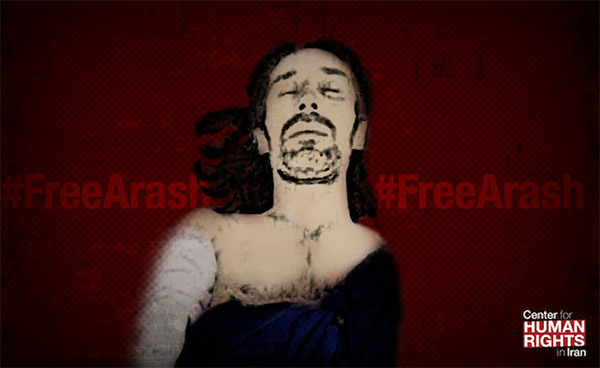 October 1, 2018 – Iranian authorities should immediately free political prisoner Arash Sadeghi so he can receive medical care for serious health issues that require urgent and sustained care, the Center for Human Rights in Iran (CHRI) said in a statement today.
October 1, 2018 – Iranian authorities should immediately free political prisoner Arash Sadeghi so he can receive medical care for serious health issues that require urgent and sustained care, the Center for Human Rights in Iran (CHRI) said in a statement today.
“Arash Sadeghi shouldn’t be in an Iranian prison in the first place, let alone struggling to access medical care for life-threatening health problems,” said CHRI’s Executive Director Hadi Ghaemi.
“It is the responsibility of Iran’s State Prisons Organization and the judiciary to safeguard the well-being of all detainees in Iran, but they are failing to protect political prisoners, including Sadeghi, from suffering irreparable harm,” added Ghaemi.
Sadeghi’s father informed CHRI on September 28, 2018, that his son may have Chondrosarcoma, a cancer that causes bone tumors, and that he is awaiting test results to determine whether a bone tumor on Sadeghi’s arm is malignant or benign.
A doctor in a hospital outside the prison discovered the tumor in June 2018 but prison authorities have consistently prevented him from receiving specialized medical treatment. After Sadeghi underwent the biopsy and was returned to Rajaee Shahr Prison in the city of Karaj, he developed a serious infection.
“His arm has gotten infected and they’re giving him high doses of antibiotics,” Hossein Sadeghi told CHRI after visiting his son in prison on September 26.
“That’s because on Saturday [September 22] they deliberately took him to the hospital when it was late and his doctor wasn’t there and so he was seen by a resident [student physician],” he said.
“They should have listened to the doctors’ orders and kept him hospitalized but Mr. Rostam [first name unknown], the prison’s judicial representative, and [Alireza] Ziaie, the prison’s director, refused and he was sent back to prison two days after the biopsy—and his own doctor has still not visited him,” added Hossein Sadeghi.
Sadeghi told CHRI that his son’s bandages were not being replaced every day as required and that the prison’s unhygienic conditions had made the infection worse.
Since June 2016, Sadeghi, 32 has been serving a 15-year prison sentence for engaging in peaceful human civil rights activism. He was imprisoned under the charges of “assembly and collusion against national security,” “propaganda against the state,” “spreading lies in cyberspace,” and “insulting the founder of the Islamic Republic.”
His wife, Golrokh Ebrahimi Iraee, has also been serving a five-year sentence in Evin Prison since 2016 for writing an unpublished story about the practice of stoning in Iran and for the content of some of her personal Facebook posts.
Political prisoners in Iran, including elderly inmates, are singled out for harsh treatment, which often includes denial of medical care. The threat of withheld medical care has also been used as an intimidation tool against prisoners who have challenged the authorities or filed complaints.
Iran’s State Prisons Organization and the judiciary are responsible for ensuring the safety and well-being of all detainees held in state custody. The State Prison Procedures state in Article 120 that “The head of the prison’s infirmary is required to … [ensure] that they receive adequate care from doctors and nurses, [and] he must supervise the patients’ proper diet and recovery completely and continually.”
According to the UN’s Standard Minimum Rules for the Treatment of Prisoners, which all UN Member States are expected to abide by, “…Sick prisoners who require specialist treatment shall be transferred to specialized institutions or to civil hospitals.”
Yet no Iranian official has been held accountable for the multiple documented cases of death or irreparable harm suffered by political prisoners due to the lack of proper medical care in prison and the authorities denying them adequate recovery time or outside medical treatment and care.
The case of former political prisoner Alireza Rajaei, who lost part of his face in August 2017 due to sinus cancer that was left untreated in Evin Prison, put the spotlight on the ongoing denial of medical care to political prisoners in Iran.
Three months later, in October 2017, labor activist Mohammad Jarrahi died from thyroid cancer that was left untreated while he was held as a political prisoner in Tabriz Prison. Fellow labor activist Shahrokh Zamani had also died of a heart attack in September 2015 after being denied medical care in Rajaee Shahr Prison.
Political prisoner Omid Kokabee was diagnosed with advanced kidney cancer in 2016 after years of repeatedly being denied treatment for his symptoms in Evin Prison.
“Iran claims it doesn’t torture political prisoners but it has a documented history of denying them critical medical care,” said Ghaemi. “The lives lost and the serious and permanent health damage suffered are tantamount to torture.”
“Iran should immediately free Arash Sadeghi so this young man can go home and receive the care that is his right under Iranian and international law,” he added.
For interviews, contact:
Hadi Ghaemi
+1-917-669-5996
hadighaemi@iranhumanrights.org
Visit our website: www.iranhumanrights.org
